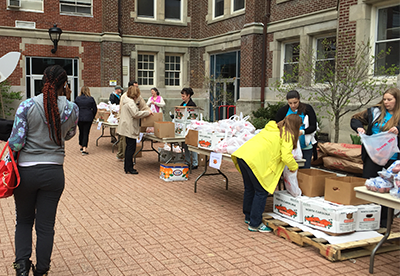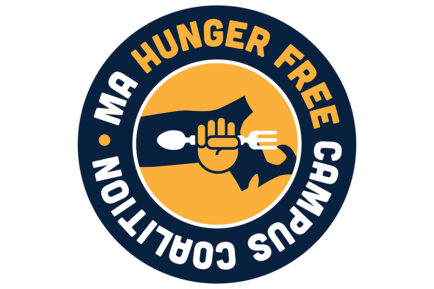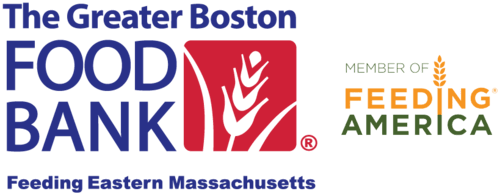Hunger on Campus: Leading the Statewide Charge
Part One: Hunger on Campus
How The Greater Boston Food Bank is Leading the Statewide Charge

“College students are the forgotten population when we think about hunger,” says Salem State’s Rachel Frank, a case manager at the college. “There is a perception that being a college student is about privilege. But that is not true.” Frank explains that most students have enough to pay tuition and have virtually nothing left after that. When the government changed the eligibility guidelines for SNAP benefits, (formerly food stamps), Salem State discovered that over 50% of their students qualified for assistance. A recent statewide study estimated that 37% of Massachusetts public college students reported food insecurity in the past 30 days.
This is not simply a Salem problem. Nor is it a Massachusetts problem. Campus hunger is national problem. In 2018, the GAO commissioned a nationwide study of food insecurity of college campuses and found that on average over 30% of all full-time enrolled students in the U.S. need help. (This study was completed pre-pandemic. It is likely that the numbers have increased since then.) While the need is often higher at community colleges than at private 4-year institutions, campus hunger is hiding in plain sight in library carrels, classrooms, dorm rooms, computer labs, and athletic fields all over the country.
“The most prominent emotion I feel as a hungry college student is fear. Not fear of being hungry itself, but fear of how my hunger will impact my ability to succeed academically. There are so many ways that hunger negatively impacts study time. Time is wasted gathering scraps of food, from here, there, and everywhere. Those scraps of food need to somehow be assembled into something edible… Every single time I buy or consume food, I have to think about it in context of making sure I have enough for later. Almost every food choice I make is made from a place of fear and scarcity. The second most prominent emotion I feel is guilt. I feel guilty that I don’t manage my resources better. I feel guilty eating anything that is not dirt cheap and prepared from scratch.”
Molly Kepner, GBFB’s Senior Government Relations Coordinator and a co-lead on the Massachusetts Hunger-Free Campus Coalition, knows from personal experience how hard it can be to be hungry and to try to focus on your academic studies. And it fuels her passion for her work.
“Eating Ramen shouldn’t be seen as a rite of passage in college. It should be seen as an underlying issue of a system that is failing to support our student’s basic needs,” she says, remembering her days as a food-insecure student who relied on financial aid and juggled a full course load, jobs, internships, and extracurriculars. “I remember relying on a tiny can of Chef Boyardee to get me through the day at my unpaid internship. College students should be worrying about their studies – not where their next meal is coming from. That’s what inspires me to do this work every day.”

In 2019, GBFB, the Food Bank of Western MA (FBWMA), Massachusetts Law Reform Institute, and Central West Justice Center convened the Hunger-Free Campus Coalition composed of students, college staff, and anti-hunger organizations from across the Commonwealth. The co-led coalition now numbers between 40 and 50 members who worked together to draft legislation to address college student hunger and food insecurity. It is modeled on successful programs in other states including Minnesota, New Jersey, and California.
The goal, says Molly, “….is not to tinker around the edges, but to address college hunger systematically, to get at the root causes.”
After over a year of building the coalition, the bill was filed in February of 2021, with a public hearing date currently scheduled for October 7th of this year. Sponsored by Representatives Andy Vargas of Haverhill, Mindy Domb of Amherst, and Senator Harriette Chandler of Worcester, the bill will call for a $1 million dollar appropriation to fund the establishment of the Hunger-Free Campus Initiative, a statewide grant program with accompanying state staff support to incentivize public and not-for-profit institutions serving a significant number of low-income students to implement anti-hunger initiatives on their campuses.
In a nutshell, Molly explains, “H.1368 and S.822 means that there will be funding for new staff at the Department of Higher Education to implement programs to give the colleges needed technical guidance.” The bill’s goal is to ensure that on every specified campus in Massachusetts, there will be a dedicated staff person whose primary task is addressing food and basic needs insecurity within their campus community. No longer will student hunger be swept under the rug on our campuses.
UPDATE: Watch the virtual public hearing and help us drum up support for this bill by contacting your state legislator and asking them to cosponsor H.1368/S.822!
